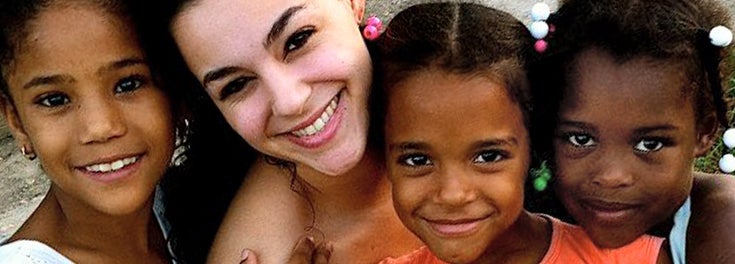
For some, winter break means relaxing on the beach or hitting the slopes. But these days, many URI students are choosing to spend the time earning extra credits while they experience another culture, explore a new subject, or engage in a service project.
These enticing options are all possible thanks to URI’s Winter J Term, a January mini-semester the University instituted last year. Our first J Term featured nine travel courses and 21 undergraduate- and graduate-level classes, offered on campus or online in two intense weeks that can accelerate the path to graduation.
Many students are drawn to the international opportunities J Term offers. Last year a dozen students traveled to Indonesia to study access to clean water and public health in a developing nation. Led by URI Geosciences Professors Thomas Boving and Anne Veeger, the students were immersed in the daily life of rural and urban Indonesians, observing what Professor Boving called “the dirty underbelly and the glitzy side” of the country. The three-credit course included collaborations with Indonesian university students on investigations into sustainable solutions and technologies for providing safe and reliable drinking water to all regions of the country.
That trip forced me to jump out of my comfort zone and learn about things I never knew were there.
“The trip changed my character as a human being forever,” said Stamati Tsatsaronis, a political science major. “It completely put everything in perspective for how I see the world, and I will always be in debt to the people of Indonesia for what they taught me. That trip forced me to jump out of my comfort zone and learn about things I never knew were there.”
This year there are even more choices. You could make a documentary film in Belize, learn about political and social change in Cuba, or study aquaculture in the Philippines. And if you would like to add a service learning component to your winter travels, you could consider building a sustainable energy system in Chile, providing health education in the Dominican Republic, or volunteering at soup kitchens, food banks, or housing programs in Washington, D.C.
Last year, education major Brittany Alejo served as a tutor in a literacy program at a camp for sugar cane workers in Haiti as part of a trip led by Political Science Professor Maureen Moakley. Along the way, she also learned to speak Creole and taught various age groups math, reading, and writing in both Spanish and English. “When we first pulled up and stepped off the bus, a girl grabbed each of my hands like she was claiming me, and another grabbed my leg,” Brittany said. “They were excited about the ‘Americanos.’ They weren’t shy at all. It was truly amazing.”
The community service trips abroad transform students’ point of view, said Kelly Watts, coordinator of faculty-led programs. “They come back a different person. Rarely is there a student who isn’t changed by the experience.”
